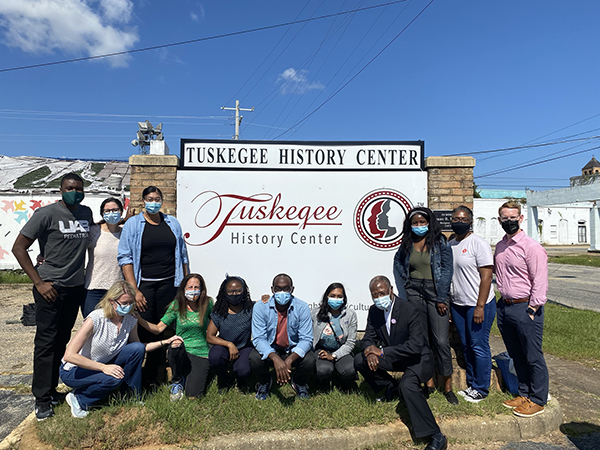 The Health Equity Scholars and program directors Last week, the UAB Pediatrics Health Equity Scholars spent three days participating in an immersive experience to explore the historical context of health disparities and inequities within Alabama. The group traveled throughout the Black Belt of Alabama, visiting places pivotal to the Civil Rights Movement and areas battling current health disparities and inequities.
The Health Equity Scholars and program directors Last week, the UAB Pediatrics Health Equity Scholars spent three days participating in an immersive experience to explore the historical context of health disparities and inequities within Alabama. The group traveled throughout the Black Belt of Alabama, visiting places pivotal to the Civil Rights Movement and areas battling current health disparities and inequities.
In Montgomery, AL they visited the Legacy Museum and National Memorial for Peace and Justice. The museum and national memorial were established in 2018 by the Equal Justice Initiative and teach about the history of racial inequality in America and honor the legacy of enslaved Black people and lynching victims.
 The Health Equity Scholars and program directors The group visited Selma, AL and spoke with Selma High School students along with our UAB Selma Family Medicine colleagues. Selma was at the center of the Civil Rights Movement and was the starting point for three marches in support of African American voting rights.
The Health Equity Scholars and program directors The group visited Selma, AL and spoke with Selma High School students along with our UAB Selma Family Medicine colleagues. Selma was at the center of the Civil Rights Movement and was the starting point for three marches in support of African American voting rights.
To learn more about current health disparities and inequities impacting people in Alabama, the group met with a local wastewater activist, Ms. Perman Hardy, in Lowndes County. They learned more about the issue of sewage treatment in the Black Belt and its impact on the health of the people in the area.
 The Health Equity Scholars, program directors and Ms. Perman HardyThe last stop of the immersive experience was Tuskegee, AL. The group met with bioethicist, Dr. Stephen Sodeke, at the Tuskegee Historic Center and discussed the origins of medical mistrust by learning more about the Tuskegee Syphilis Study.
The Health Equity Scholars, program directors and Ms. Perman HardyThe last stop of the immersive experience was Tuskegee, AL. The group met with bioethicist, Dr. Stephen Sodeke, at the Tuskegee Historic Center and discussed the origins of medical mistrust by learning more about the Tuskegee Syphilis Study.
 Top L to R: Justin Bailey, Austin Oslock, Lauren Rosati, Jasmine Capers, Tanzeh Metzger, Destini Smith, Brad Fancher, and Vida Laudarji
Top L to R: Justin Bailey, Austin Oslock, Lauren Rosati, Jasmine Capers, Tanzeh Metzger, Destini Smith, Brad Fancher, and Vida LaudarjiThe Health Equity Scholars are a group of pediatric and medicine-pediatric residents who are interested in leading advances in health equity for children. The program is led by Morissa Ladinsky, M.D., associate professor in the Division of Academic General Pediatrics, Chrystal Rutledge, M.D., associate professor in the Division of Pediatric Critical Care, and Tina Simpson, M.D., MPH, professor in the Division of Adolescent Medicine. Along with twice yearly immersive experiences, scholars meet throughout the year for didactic and experiential learning and participate in a quality improvement project to improve child health equity.
The wonderful opportunity to learn from history and each other to overcome social, cultural, and systemic barriers to equitable care has been made possible through generous gifts from the Carlo Family, Dr. Iris D. Fancher and Ms. Andrea Martin. The scholars and faculty leaders would like to thank these donors for supporting the Health Equity Scholars Program!
The wonderful opportunity to learn from history and each other to overcome social, cultural, and systemic barriers to equitable care has been made possible through generous gifts from the Carlo Family, Dr. Iris D. Fancher and Mrs. Andrea Martin. The scholars and faculty leaders would like to thank these donors for supporting the Health Equity Scholars Program!